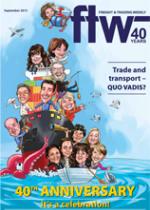It was a fiery South American
temperament and impatience
with ineptitude that brought a
new era of electronic customs
clearance to South Africa.
In the early 1960s, when
Compu-Clearing chairman Arnold
Garber – an importer of computer
software at the time – was
confronted by the frustrations of
tedious and error-prone customs
procedures, he saw an opportunity
and acted on it. And few will
disagree that EDI (electronic data
interchange) has been one of the
biggest game-changers for the
freight industry over the past 40
years.
Garber has spent his entire
working life in the computer
industry, starting off as a
programmer at the age of 17 when
every programme was customdesigned.
The advent of off-theshelf
packages, pioneered in the
US, presented an opportunity
for the young Garber who
began importing the packages –
something that brought him face
to face for the first time with an
unknown quantity, Customs.
“After ordering the package
from the US, I told them to put
two line items on the invoice –
one for the computer programme
that paid no duty, and one for the
blank tape that paid 45% duty.”
Garber appointed a clearing
agent – but since no-one had ever
imported computer software,
no-one understood the tariff
headings.
“The entry clerk declared the
entire R5000 value of the product
as blank tape, which meant 45%
on the entire amount – and that
involved paying up and applying
for a refund.
“When exactly the same thing
happened second time round, I
lost my cool, went to the airport
and decided to do my own
clearing.”
And this was where Garber
was faced with a hall filled with
people with the same form – a
Customs bill of entry – all being
processed manually. WTC Rand
was the only company at the time
that was computerised.
And that’s what planted the
seed that changed the industry.
After writing the programme
– which took a year – Garber
hocked every
last bit of equity
that he owned
and bought his
first computer.
Schenker was
his first client,
followed by
Safcor – with
many more
following in
quick succession.
Customers were charged per
customs entry – which remains
the company’s business model 30
years later. Payment of penalties
resulting from an incorrect
declaration is another business
model that has stood the test of
time, said Garber. “If the duty is
incorrect we pay the penalty –
and if there’s demurrage involved
we’ll pick that up too. And the
amount we have paid out is a
minimal percentage of our annual
turnover.”
But changing with the times
is part and parcel
of every company’s success
strategy. With the customs
clearing product firmly in place,
Compu-Clearing has partnered
with CargoWise, and through its
ediEnterprise system is able to
offer a complete single platform
incorporating forwarding,
breakbulk and de-groupage
modules as well as online quoting
and order management.
And while computer systems
may have simplified the clearance
process beyond expectation, for
the future Garber is convinced
that there will always be a role for
the clearing agent.
“The Customs EDI process will
continue, preclearance
will continue, but importers are
unlikely to take over the clearing
process from their agents. It’s not
happening now and won’t happen.
Outsourcing will continue.
Importers can save money
doing their own clearing until
something goes wrong.”
For Compu-Clearing, says
Garber, the future lies in
diversification with synergies.
“Our plan going forward is to
look for acquisitions in allied
areas – like a company that
manages fuel consumption of
vehicles. We see it as synergistic.
We’re also looking at getting into
other related fields like trade
finance.”
And for the 66-year-old
Garber, slowing down is not
an option. As technology
changes and evolves he will
continue to explore new
ideas and new technologies
to move the company – and
the industry – forward.
INSERT & CAPTION
There will always be a role
for the clearing agent.
– Arnold Garber

